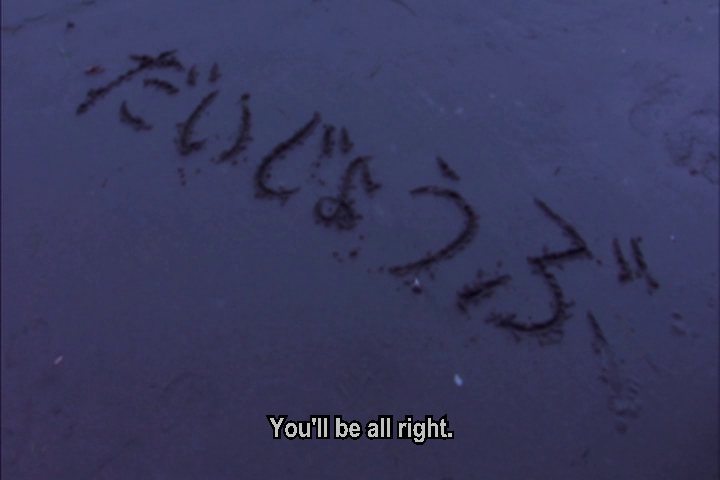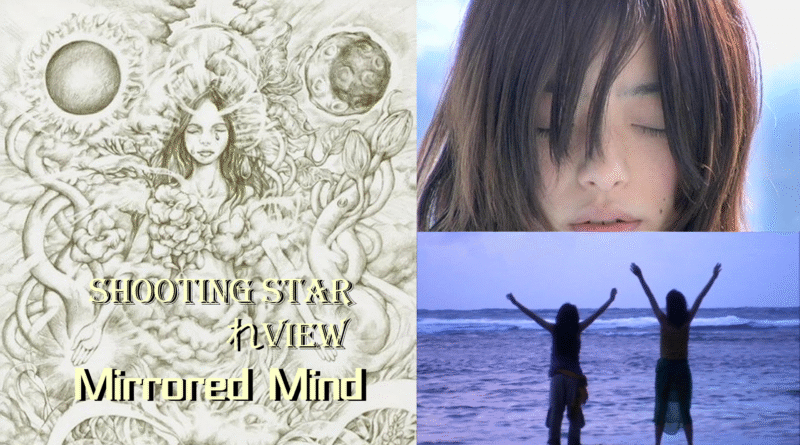The Movie That [may have] Saved My Life – Mirrored Mind Review
Hello again, Star Family! Right in time for its 20th anniversary, we have Mirrored Mind (Japanese: 鏡心 Kyoshin), a 2005 short film directed by Sogo Ishii (currently going by Gakuryuu Ishii), released during the Jeonju International Film Festival, essentially South Korea’s Tribeca Film Festival. On the list of things I didn’t intend to cover, much less watch, a movie wasn’t one of them at all. It’s a short film, peaking at just over an hour, but there’s a lot to take in, and the messages hit harder for someone watching it for the first time. As these are my thoughts, due to the nature of the film, there will be spoilers, but I promise I’ll keep them relevant and scarce.
How I discovered this movie was interesting. I do not support the concept of “doom scrolling” on the internet, a.k.a viewing posts, topics, and threads that relate to the current state of affairs. I feel like we have enough on our plate for someone to remind us that the world is bleak and gray when we envision sunsets at the beach. Why rummage through the unsettling bustle of the city to lead to another disappointing day of being a self-perceived failure when I can feel the sand under my feet, hearing the crashing waterfalls behind me?
“What is the rhythm of nature?” This is one of the first questions that our nameless heroine asks as she struggles to keep her composure in front of her film crew. Another common theme in Mirrored Mind is the lack of names, so if I mention The Actress, I mean the protagonist, and so on. In the opening dialogue, her partner asks her to give up on her dream and find other means to live. Her rebuttal is without the passion of a dream, what good is eating and drinking?
This back and forth continues until it’s revealed that this was part of a scene for her movie, with lines she had written. What was initially thought of as a genuine heart-to-heart between two people was instead a scripted event. Everyone in the studio can clearly see the pain in her voice, the bangs of her hair covering her face as she sits legs crossed, hand on her mouth, muffling tears.
Leading up to this, we see snippets of her daily routine mixed with camera shots of Shibuya and the rest of Tokyo. The colors are muted and grey in the daytime, and the nights are just as dark. She stands at the crosswalk with a disinterested expression in her eyes and ends her evenings with a White Russian drink she mixes while continuing to work on projects at home. Showing concern for her well-being while also remaining firm on the ever-shrinking budget for her movie, the director threatens to cut the cord while subtly highlighting her previous failed projects.
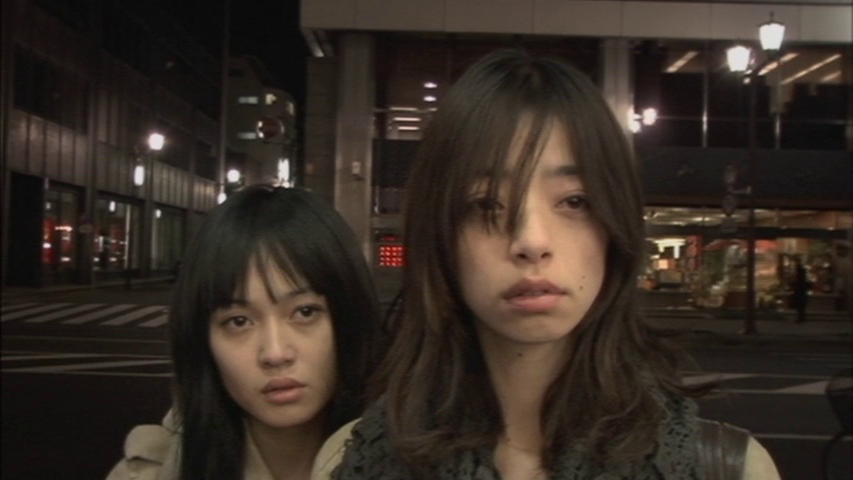
While walking home after these events, she comes across a TV advertisement showing a beach in the sunset. Nature is as beautiful as it’s captured in a snapshot. But why settle for a snapshot when you can just escape to the beach? After one too many rough days, this is what the actress decides is the best response. If everything is going to shit, why not leave it all behind? There’s another woman who appears before her, watching the same advertisement, seemingly agreeing with the actress’s sentiment.
“We’re born to be happy, this is my happiness, therefore I belong here.”
What I found interesting about the transition from the city to the beach is how sudden it appears. We see her luggage bag halfway packed and the running shower water in one scene, transitioning to the palm trees, flowers, and waterfalls mentioned earlier. While she’s finally at peace, she comes across signs that tell her, as well as the viewer, that this paradise isn’t what it’s made up to be. Signs left behind by a random stranger, with encouraging messages seemingly meant for her. The actress thinks nothing of it, but she continues to enjoy her solitude and serenity.
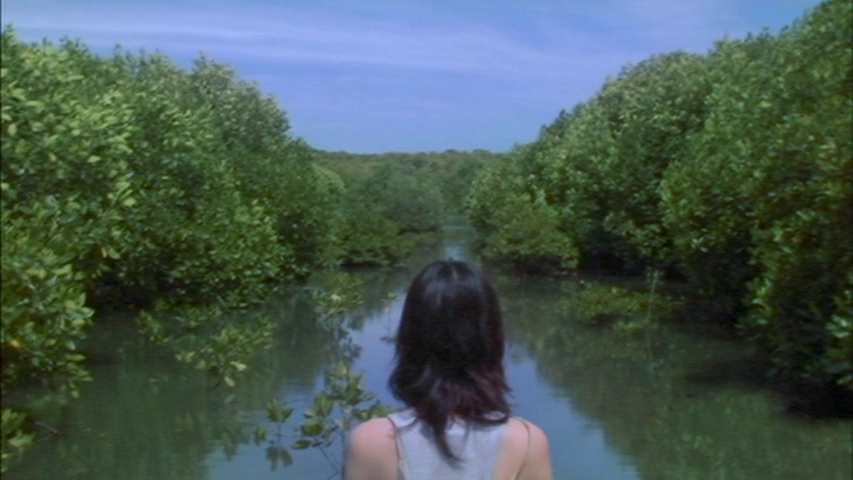
That is, until she comes across another woman on the beach. The same woman whom she met in the city who watched the same advertisement with her. Up until this point, we’ve never seen the actress smile or show any form of emotion aside from the forced, cracked smile leading to her breaking point. When she sees the city girl, we see jubilation from our protagonist, and the girl returns the emotion in kind. There’s someone else on this island with her. Our actress is no longer alone, and she’s at peace with herself.
This is what the city girl reminds our protagonist. The only way to be at peace with yourself is to accept the world created in your mind. Hence, we come to the name of the movie: Mirrored Mind. The girl tells her that while she’s staying on the island forever, there’s someone “waiting for [the actress] back in the city.” That someone is the protagonist.
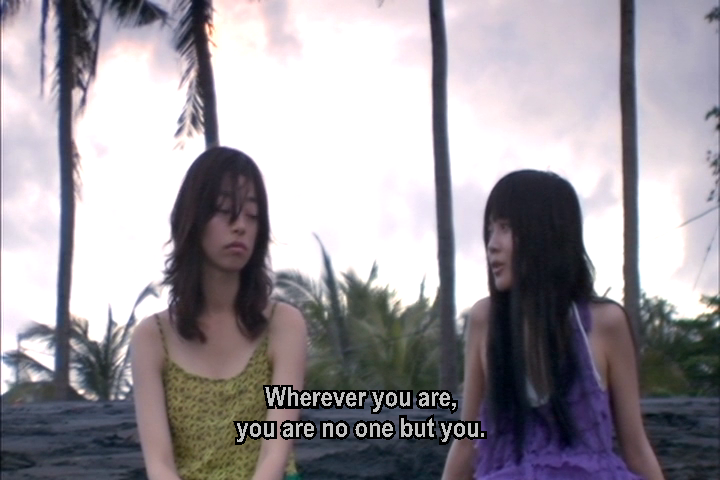
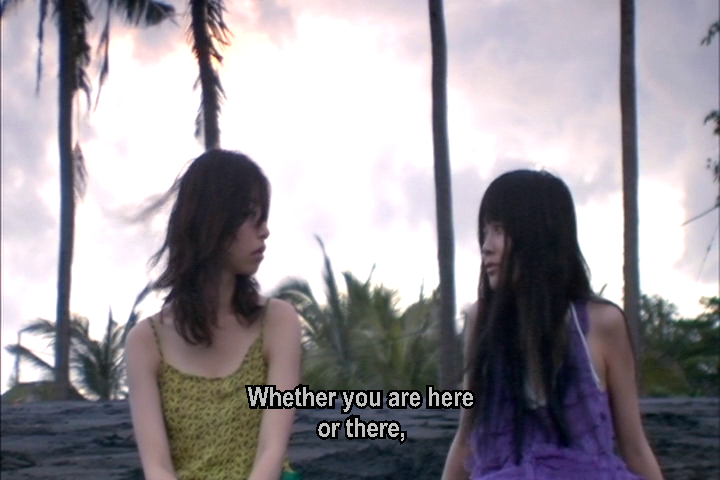
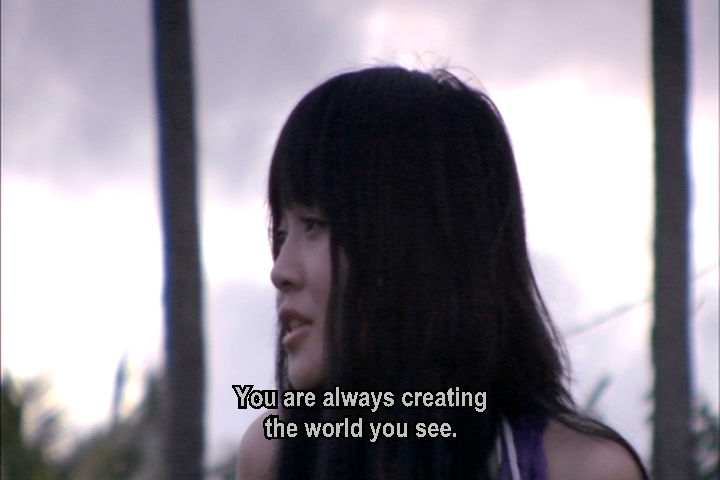
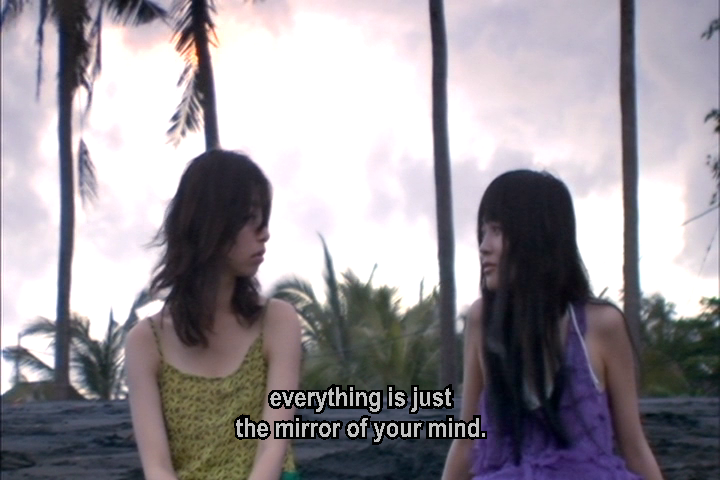
This is very hard to type without the inclusion of names, and this is also where the ending begins, so, once again, I’ll gently remind spoilers.
When we return to Tokyo, we see the actress with a face mask lying on a hospital bed. As it turns out, the island was nothing more than a euphemism for the escape that our protagonist “runs off” to. What actually happened was during this particular night, she added a new ingredient to the White Russian she mixes before bed; A bottle of painkillers. Her waking up from her vacation dream was her waking up back to reality, a near-death experience. On the bed adjacent to her is another body being worked on by nurses, trying their best to resuscitate, but to no avail. It’s revealed that the body was the same woman who was the “city girl” on the island. The same “city girl” whom she met, watching the same television ad.
After this experience, she slowly begins to improve her mental health. We see at the end of the movie that there are more sunny days, there’s a spright in her step, and some of the actions we see her doing during her “freedom on the beach,” we see her do here, including stretching and tending to her own garden. Happily ever after, right? You put yourself through a near-death experience and start to appreciate the values of life, as whatever stands before you is a mere reflection of the mind. So exactly how much of everything that happened in the past hour was true?
This is something that the narrator brings up, detailing the events of what happens to our actress. She moves on and keeps going. Certainly, with her head above in the clouds and not low to the ground, but she perseveres. We, as the viewer, are never told if anything that happened actually did. We saw her almost overdose on pills, but how much of that was part of the script she had written, and how much of what we saw was real?
My interpretation was that these events actually did happen, though not to the exaggeration of the movie. I do believe the actress tried to overdose and, in her stupor, did end up on a metaphorical beach in her mind. But was the city girl real, or was that also a figment of the mirror in her mind that she created? Creating an attractive woman who understands you better than you know yourself, to give yourself the motivation to fight onward that you can’t find in yourself. That’s something relatable to many, including myself, where I cannot find the strength to go on through “fumes” alone.
Ending spoilers end here, those were my interpretations of it anyway.
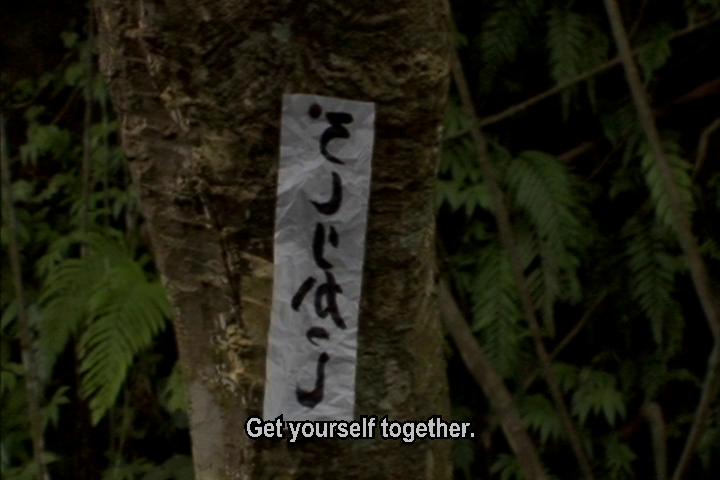
Overall, Mirrored Mind was the perfect film length for the kinds of messages it conveys. It gets to the point quickly and doesn’t pull its punches. This is a drama that was meant to capture the struggles of self-worth, identity, and self-love. The plot centered around the actress and how she views her life. Sometimes a simple change in perspective can alter one’s perception of life. If you can’t run away to a resort physically, and remaining lost in your own world is just as dangerous, how do you find the “rhythm of nature” amidst the sea of chaos? The answer to that question is one we spend our whole lives searching for, but it gets easier with time.
Despite its cult following over the years, Mirrored Mind‘s availability remains scarce. While it did see a DVD release, it was never released on streaming platforms. To this day, Ishii is directing films. The lead actress who played the actress, Miwako Ichikawa, is recently more known for her role in Call Me Chihiro, another film that has been recommended by close friends.
You can find this movie subbed without much difficulty, however. Not sure how long this link will last, but a generous uploader made it available on the ‘Tube. Be sure to turn on CC for the English subs.
Regardless of how you discover this work of art, Mirrored Mind‘s messages, atmosphere, and the raw emotion from Ichikawa were enough to drive even me to tears. Although it doesn’t take much, with my emotional ass. Still, this is a movie I highly recommend everyone to check out, especially those of us who struggle with depression and “not feeling good enough.” If you’re not “good enough,” be the best you can for yourself.
Shooting Star Recommends.
